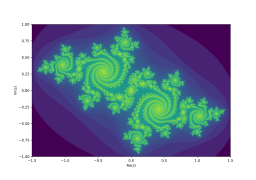#Julia set fractal
Explore tagged Tumblr posts
Text

11 notes
·
View notes
Text
Women aren't usually my cup of tea BUT Goddam!! Look at the CURVES on julia!💘😩🤭
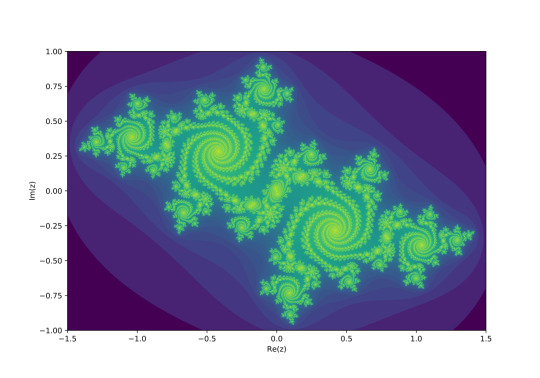
GOD she so mathematically intirciate I'm DROOLING 🤤 😋 😩 😫
Just look what she's got hidden under there ❤️

Hnnnn you can rotate her in SIX diffrent dimensions she Is just so Flexible 😉 😜 😘 😉 😜 😘
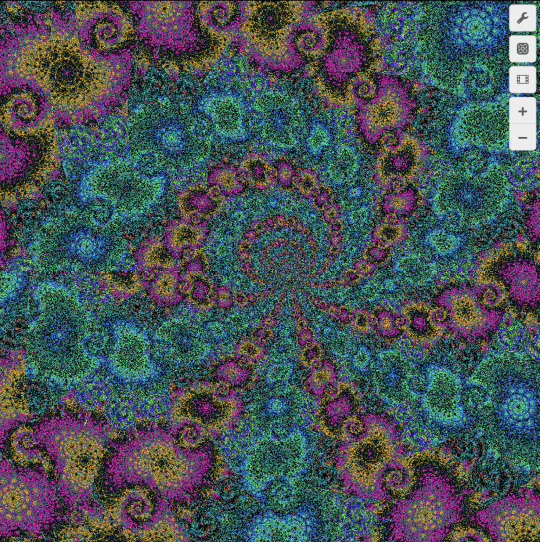
Ohh my god QUEEN you contain the mathematical beauty of the universe in you

Is it just me or is it getting hot in here!!

I need her too step on me so bad
934 notes
·
View notes
Text
That was a lot of chessposting. Have some quaternion julia sets, as a treat These act as 3D slices of 4D extensions of julia sets. I believe this one is cubic in nature. To render these we use some math I dont understand from this blog to generate a distance estimator that can then be used to raymarch the sets. Raymarching is essentially marching along rays coming from the camera, only moving as far as we know we can move safely in any direction, until we hit something. This safe distance is where the distance estimator comes in. Anyways pretty pictures
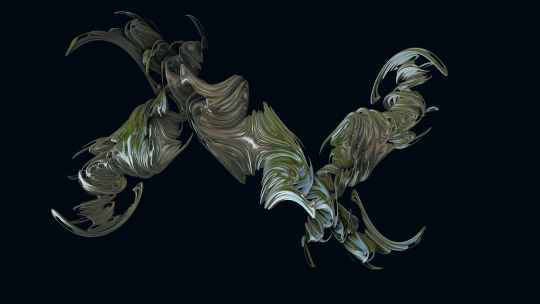
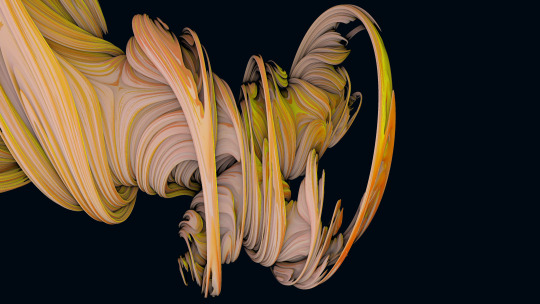
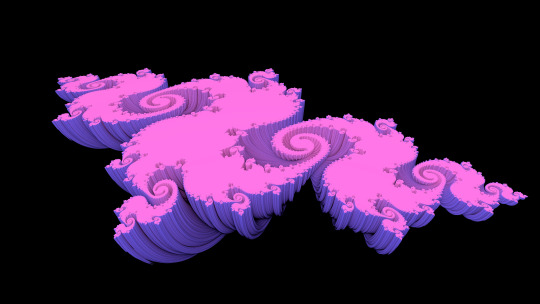
This one I have a 3D print of
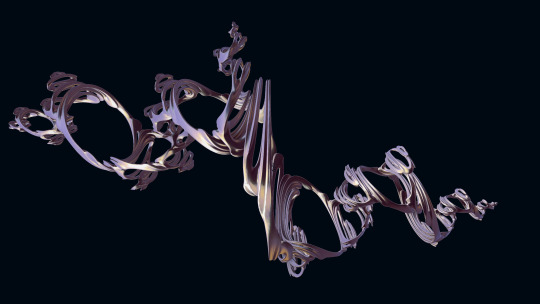
And this one I've colored the slice of it based on the coloration of the corresponding 2D julia set
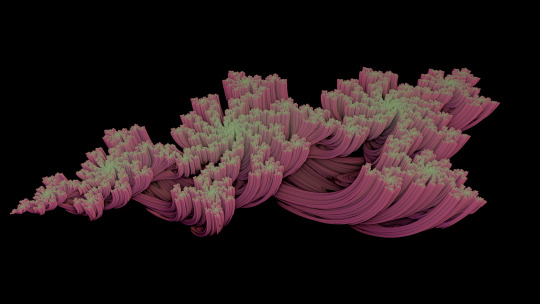
57 notes
·
View notes
Text
Sometimes it takes some bullshit

To make some bullshit

8 notes
·
View notes
Text
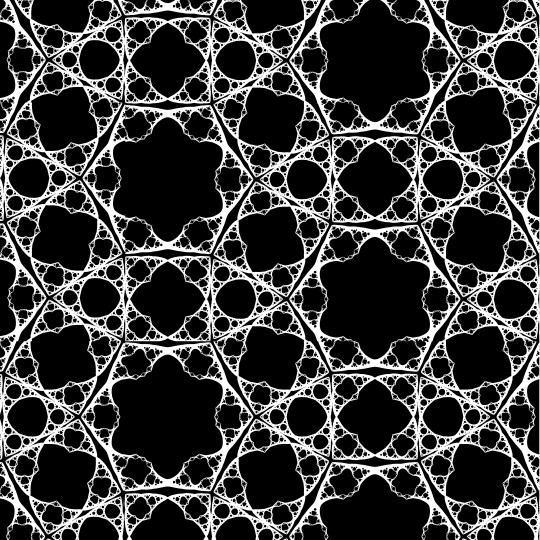
Tessellation of Julia Set Fractals
1 note
·
View note
Text
orphic; (adj.) mysterious and entrancing, beyond ordinary understanding. ─── 008. the email.

-> summary: when you, a final-year student at the grove, get assigned to study under anaxagoras—one of the legendary seven sages—you know things are about to get interesting. but as the weeks go by, the line between correlation and causation starts to blur, and the more time you spend with professor anaxagoras, the more drawn to him you become in ways you never expected. the rules of the academy are clear, and the risks are an unfortunate possibility, but curiosity is a dangerous thing. and maybe, just maybe, some risks are worth taking. after all, isn’t every great discovery just a leap of faith? -> pairing: anaxa x gn!reader. -> tropes: professor x student, slow burn, forbidden romance. -> wc: 3.3k -> warnings: potential hsr spoilers from TB mission: "Light Slips the Gate, Shadow Greets the Throne" (3.1 update). main character is written to be 21+ years of age, at the very least. (anaxa is written to be around 26-27 years of age.) swearing, mature themes, suggestive content.
-> a/n: yum. good night, see you next week <3 -> prev. || next. -> orphic; the masterlist.

On the board: a rough, sketched spiral that narrowed into itself. Then—without explanation—he stepped back and faced the room.
“The Julia Set,” he began, “is defined through recursive mapping of complex numbers. For each point, the function is applied repeatedly to determine whether the point stays bounded—or diverges to infinity.”
He turned, writing the equation with a slow, deliberate hand, the symbols clean and sharp. He underlined the c.
“This constant,” he said, tapping the chalk beneath it, “determines the entire topology of the set. Change the value—just slightly—and the behavior of every point shifts. Entire regions collapse. Others become beautifully intricate. Sensitive dependence. Chaotic boundaries.”
He stepped away from the board.
“Chaos isn’t disorder. It's order that resists prediction. Determinism disguised as unpredictability. And in this case—beauty emerging from divergence.”
Your pen slowed. You knew this was about math, about structure, but there was something in the way he said it—beauty emerging from divergence—that caught in your ribs like a hook. You glanced at the sketch again, now seeing not just spirals and equations, but thresholds. Points of no return.
He circled a section of the diagram. “Here, the boundary. A pixel’s fate determined not by distance, but by recurrence. If it loops back inward, it’s part of the set. If it escapes, even by a fraction, it’s not.”
He let the silence stretch.
“Think about what that implies. A system where proximity isn’t enough.”
A few students around you were taking notes rapidly now, perhaps chasing the metaphor, or maybe just keeping up. You, however, found yourself still. His words hung in the air—not heavy, but precise, like the line between boundedness and flight.
Stay bounded… or spiral away.
Your eyes lifted to the chalk, now smeared faintly beneath his hand.
Then—casually, as if announcing the time—he said, “The application deadline for the symposium has closed. Confirmation emails went out last night. If you don’t receive one by tonight, your submission was not accepted.”
It landed in your chest like dropped glass.
It’s already the end of the week?
You sat perfectly straight. Not a single muscle out of place. But you could feel your pulse kicking against your collarbone. A kind of dissonance buzzing at the edges of your spine. The type that doesn’t show on your face, but makes every sound feel like it’s coming through water.
“Any questions?” he asked.
The room was silent.

You waited until most of the students had filed out, notebooks stuffed away, conversations trailing toward the courtyard. Anaxagoras was still at the front, brushing residual chalk from his fingers and packing his notes into a thin leather folio. The faint light from the projector still hummed over the fractal diagram, now ghostlike against the faded screen.
You stepped down the lecture hall steps, steady despite the pressure building in your chest.
“Professor Anaxagoras,” you said evenly.
He glanced up. “Yes?”
“I sent you an email last night,” you said, stepping forward with a measured pace. “Regarding the papers you sent to me on Cerces’ studies on consciousness. I wanted to ask if you might have some time to discuss it.”
There was a brief pause—calculated, but not cold. His eyes flicked to his watch.
“I saw it,” he said finally. “Though I suspect the timing was… not ideal.”
You didn’t flinch. “No, it wasn’t,” you said truthfully. “I was… unexpectedly impressed, and wanted to follow up in person.”
You open your mouth to respond, but he speaks again—calm, almost offhanded.
“A more timely reply might have saved me the effort of finding a third paper.”
You swallow hard, the words catching before they form. “I didn’t have anything useful to say at the time,” you admit, keeping your voice neutral. “And figured it was better to wait to form coherent thoughts and opinions… rather than send something half-baked.”
He adjusts his cuff without looking at you. “A brief acknowledgment would have sufficed.”
You swallow hard, the words catching before they form. “Right,” you murmur, choosing not to rise to it.
Another beat. His expression was unreadable, though you thought you caught the flicker of something in his gaze.
He glanced at the clock mounted near the back of the hall. “It’s nearly midday. I was going to step out for lunch.”
You nodded, heart rising hopefully, though your face stayed calm. “Of course. If now isn’t convenient—”
He cut in. “Join me. We can speak then.”
You blinked.
“I assume you’re capable of walking and discussing simultaneously.” A faint, dry smile.
So it was the email. And your slow response.
“Yes, of course. I’ll get my things.”
You turned away, pacing steadily back up the steps of the hall toward your seat. Your bag was right where you left it, tucked neatly beneath the desk—still unzipped from the frenzy of earlier note-taking. You knelt to gather your things, pulling out your iPad and flipping open the annotated PDFs of Cerces’ consciousness studies. The margins were cluttered with highlights and your own nested comments, some so layered they formed little conceptual tangles—recursive critiques of recursive thought. You didn’t bother smoothing your expression. You were already focused again.
“Hey,” Kira greeted, nudging Ilias’s arm as you approached. They’d claimed the last two seats in the row behind yours, and were currently sharing a half-suppressed fit of laughter over something in his notebook. “So… what’s the diagnosis? Did fractals break your brain or was it just Anaxagoras’ voice again?”
You ignored that.
Ilias leaned forward, noticing your bag already packed. “Kira found a dumpling stall, we were thinking of-”
You were halfway through slipping your tablet into its case when you said, lightly, “I’m heading out. With Professor Anaxagoras.”
A pause.
“You’re—what?” Ilias straightened, eyebrows flying up. “Wait, wait. You’re going where with who?”
“We’re discussing Cerces’ papers,” you said briskly, adjusting the strap across your shoulder. “At lunch. I emailed him last night, remember?”
“Oh my god, this is about the symposium. Are you trying to—wait, does he know that’s what you’re doing? Is this your long game? I swear, if you’re using complex consciousness theory as a romantic smokescreen, I’m going to—”
“Ilias.” You cut him off with a look, then a subtle shake of your head. “It’s nothing. Just a conversation.”
He looked at you skeptically, but you’d already pulled up your annotated copy and were scrolling through notes with one hand as you stepped out of the row. “I’ll see you both later,” you added.
Kira gave you a little two-finger salute. “Report back.”
You didn't respond, already refocused.
At the front of the lecture hall, Anaxagoras was waiting near the side doors, coat over one arm. You fell into step beside him without pause, glancing at him just long enough to nod once.
He didn’t say anything right away, but you noticed the slight tilt of his head—acknowledging your presence.
You fell into step beside him, footsteps echoing softly down the marble corridor. For a moment, neither of you spoke. The quiet wasn’t awkward—it was anticipatory, like the silence before a difficult proof is solved.
“I assume you’ve read these papers more than once,” he said eventually, eyes ahead.
You nodded. “Twice this past week. Once again this morning. Her model’s elegant. But perhaps incorrect.”
That earned you a glance—quick, sharp, interested. “Incorrect how?”
“She defines the recursive threshold as a closed system. But if perception collapses a state, then recursion isn’t closed—it’s interrupted. Her architecture can’t accommodate observer-initiated transformation.”
“Hm,” Anaxagoras said, and the sound meant something closer to go on than I disagree.
“She builds her theory like it’s immune to contradiction,” you added. “But self-similarity under stress doesn’t hold. That makes her framework aesthetically brilliant, but structurally fragile.”
His mouth twitched, not quite into a smile. “She’d despise that sentence. And quote it in a rebuttal.”
You hesitated. “Have you two debated this before?”
“Formally? Twice. Informally?” A beat. “Often. Cerces doesn’t seek consensus. She seeks pressure.”
“She’s the most cited mind in the field,” you noted.
“And she deserves to be,” he said, simply. “That’s what makes her infuriating.”
The breeze shifted as you exited the hall and entered the sunlit walkway between buildings. You adjusted your bag, eyes still on the open document.
“I marked something in this section,” you said, tapping the screen. “Where she refers to consciousness having an echo of structure. I don’t think she’s wrong—but I think it’s incomplete.”
Anaxagoras raised a brow. “Incomplete how?”
“If consciousness is just an echo, it implies no agency. But what if recursion here is just… a footprint, and not the walker?”
Now he did smile—barely. “You sound like her, ten years ago.”
You blinked. “Really?”
“She used to flirt with metaphysics,” he said. “Before tenure, before the awards. She wrote a paper once proposing that recursive symmetry might be a byproduct of a soul-like property—a field outside time. She never published it.”
“Why not?”
He shrugged. “She said, and I quote, ‘Cowardice isn’t always irrational.’”
You let out a soft breath—part laugh, part disbelief.
“She sounds more like you than I thought.”
“Don’t insult either of us,” he murmured, dry.
You glanced over. “Do you think she was right? Back then?”
He didn’t answer immediately. Then: “I think she was closer to something true that neither of us were ready to prove.”

Anaxagoras led the way toward the far side of the cafeteria, bypassing open tables and settling near the windows. The view wasn’t much—just a patch of campus green dotted with a few students pretending it was warm enough to sit outside—but it was quiet.
You sat across from him, setting your tray down with a muted clink. He’d ordered black coffee and a slice of what looked like barely tolerable faculty lounge pie. You hadn’t really bothered—just tea and a half-hearted sandwich you were already ignoring.
The silence was polite, not awkward. Still, you didn’t want it to stretch too long.
“I’d like to pick her mind.”
He glanced up from stirring his coffee, slow and steady.
You nodded once. “Her work in subjective structure on pre-intentional cognition it overlaps more than I expected with what I’ve been sketching in my own models. And Entanglement—her take on intersubjective recursion as a non-local dynamic? That’s… not something I want to ignore.”
“I didn’t think you would,” he said.
“I don’t want to question her,” you said, adjusting the angle of your tablet. “Not yet. I want to understand what she thinks happens to subjectivity at the boundary of recursion, where perception becomes self-generative rather than purely receptive. And many other things, but—”
He watched you closely. Not skeptical—never that—but with the faint air of someone re-evaluating an equation that just gave a new result.
You tapped the edge of the screen. “There’s a gap here, just before she moves into her case study. She references intersubjective collapse, but doesn’t elaborate on the experiential artifacts. If she’s right, that space might not be emptiness—it might be a nested field. A kind of affective attractor.”
“Or an illusion of one,” he offered.
“Even so,” you said, “I want to know where she stands. Not just in print. In dialogue. I want to observe her.”
There was a beat.
Then, quietly, Anaxagoras said, “She’s never been fond of students trying to shortcut their way into her circles.”
“I’m not trying to–.” You met his gaze, unflinching. “I just want to be in the room.”
There was a pause—measured, as always—but he understood your request.
Then, Anaxagoras let out a quiet breath. The edge of his mouth curved, just slightly—not the smirk he wore in lectures, or the fleeting amusement he reserved for Ilias’ more absurd interjections. A… strange acknowledgment made just for you.
“I suspected you’d want to attend eventually… even if you didn’t think so at the time.” He said, voice low.
He stirred his coffee once more, slow and precise, before continuing.
“I submitted an application on your behalf.” His eyes flicked up, sharp and clear. “The results were set to be mailed to me—” After a brief pause, he says, “I thought it would be better to have the door cracked open than bolted shut.”
Your breath caught, but you didn’t speak yet. You stared at him, something between disbelief and stunned silence starting to rise.
“… And?”
He held your gaze. “They approved it.” He said it matter-of-factly, like it wasn’t a gesture of profound academic trust. “Your mind is of the kind that Cerces doesn’t see in students. Not even doctoral candidates. If you ever wanted to ask them aloud, you’d need space to make that decision without pressure.”
Your heart skipped a beat, the rush of warmth flooding your chest before you could even fully process it. It wasn’t just the opportunity, not just the weight of the academic favor he’d extended—it was the fact that he had done this for you.
You looked down at your tablet for a beat, then back up. “You didn’t tell me.”
“I wasn’t sure it would matter to you yet.” His tone was even, but not distant.
Your chest tightened, heart hammering in your ribcage as a strange weight settled over you.
You leaned back slightly, absorbing it—not the opportunity, but the implication that he had practically read your mind.
You swallowed hard, fighting the surge of something fragile, something that wanted to burst out but couldn’t quite take form.
“And if I’d never brought it up?” you asked.
“I would have let the approval lapse.” He took a sip of coffee, still watching you. “The choice would have always been yours.”
Something in your chest pulled taut, then loosened.
“Thank you,” you said—quiet, sincere.
He dipped his head slightly, as if to say: of course.
Outside, through the high cafeteria windows, the light shifted—warmer now, slanting gold against the tiles. The silence that followed wasn’t awkward.

You’re halfway back to your dorm when you see them.
The bench is impossible to miss—leaning like it’s given up on its academic potential and fully embraced retirement. Dog is curled beneath it, mangy but somehow dignified, and Mydei’s crouched beside him, offering the crust from a purloined sandwich while Phainon gently brushes leaves out of its fur.
They clock you immediately.
“Look who’s survived their tryst with the divine,” Mydei calls out, peeling a bit of bread crust off for the dog, who blinks at you like it also knows too much.
“Ah,” he calls, sitting up. “And lo, they return from their sacred rites.”
You squint. “What?”
“I mean, I personally assumed you left to get laid,” Ilias says breezily, tossing a leaf in your direction. “Academic, spiritual, physical—whatever form it took, I’m not here to judge.”
“Lunch,” you deadpan. “It was lunch.”
“Sure,” he says. “That’s what I’d call him too.”
You stop beside them, arms loosely crossed. “You’re disgusting.”
Mydei finally glances up, smirking faintly. “We were betting how long it’d take you to return. Phainon said 45 minutes. I gave you an hour.”
“And I said that you might not come back at all,” Ilias corrects proudly. “Because if someone offered me a quiet corner and a waist as sntached as his, I’d disappear too.”
You roll your eyes so hard it almost hurts. “You’re projecting.”
“I’m romanticizing,” he counters. “It’s a coping mechanism.”
“So,” you ask, settling onto the bench, “Mydei, did you get accepted?”
Mydei doesn’t look up. “I did.”
Phainon sighs and leans back on his elbows. “I didn’t. Apparently my application lacks ‘structural focus’ and ‘foundational viability.’” He makes air quotes with a dramatic flourish, voice flat with mockery. “But the margins were immaculate.”
Ilias scoffs immediately, latching onto the escape hatch. “See? That’s why I didn’t apply.”
“You didn’t apply,” you repeat slowly, side-eyeing him.
“I was protecting myself emotionally,” he says, raising a finger.
“Even after Kira asked you to?” you remind him.
“I cherish her emotional intelligence deeply, but I also have a very specific allergy to what sounds like academic jargon and judgment,” he replies, hand to chest like he’s delivering tragic poetry.
You snort. “So you panicked and missed the deadline?”
“Semantics.”
The dog lets out a sleepy huff. Mydei strokes behind its ear and finally glances up at you. “I still can’t believe you didn’t apply. The panel was impressive.”
You hesitate, staring down at the scuffed corner of your boot, when your phone dings.
One new message:
From: Anaxagoras Subject: Addendum Dear Student, I thought this might be of interest as well. – A.
There’s one attachment.
Cerces_MnemosyneFramework.pdf
You click immediately.
Just to see.
The abstract alone hooks you. It’s Cerces again—only this time, she’s writing about memory structures through a mythopoetic lens, threading the Mnemosyne archetype through subjective models of cognition and reality alignment.
She argues that memory isn’t just retentive—it’s generative. That remembrance isn’t about the past, but about creating continuity. That when you recall something, you’re actively constructing it anew.
It’s dense. Braided with references. Challenging.
You hear Ilias say your name like he’s winding up to go off into another overdramatic monologue, but your focus is elsewhere.
Because it’s still there—his voice from earlier, lodged somewhere between your ribs.
"A brief acknowledgement would have sufficed."
You’d let it pass. Swallowed the dry implication of it. But it’s been sitting with you ever since— he hadn’t needed to say more for you to hear what he meant.
You didn’t know what to say. Maybe you still don’t.
But you open a reply window. anyway.
Your thumb hovers for a beat.
Re: Still interested Nice paper, Prof. Warm regards, Y/N.
The moment it sends, you want to eat your keyboard.
He replies seconds later.
Re: – “Warm” seems generous. Ice cold regards, – A.
The moment it sends, you want to eat your keyboard.
It’s a small, almost imperceptible warmth spreading across your chest, but you force it back down, not wanting to make too much of it.
Then you laugh. Not loud, but the sort of surprised, almost nervous laugh that catches in your chest, because somehow, you hadn’t anticipated this. You thought he’d be... formal. Distant. You didn’t expect a bit of humor—or was it sarcasm?
Your fingers hover over your phone again. Should you reply? What do you even say to that? You glance up, and that’s when you see it—Ilias’ eyes wide, his face scrunched in disbelief, like he’s trying to piece together the pieces of a puzzle.”
He points at you like he’s discovered some deep, dark secret. “You’re laughing?”
You groan, dragging a hand over your face, trying to will the heat out of your cheeks.
He doesn’t even try to hold back the mock horror in his voice after peeping into your phone. “Anaxagoras is the one that;s got you in a fit of giggles?”
Ilias gasps theatrically, pressing a hand to his chest. “Wait. Wait wait wait. Is he funny now? What, did he send you a meme? ‘Here’s a diagram of metaphysical collapse. Haha.’” He deepens his voice into something pompous and dry: “Student, please find attached a comedic rendering of epistemological decay.”
You’re already shaking your head. “He didn’t even say hello.”
“Even better,” Ilias says, dramatically scandalized. “Imagine being so academically repressed you forget how greetings work.”
He pauses, then squints at you suspiciously.
“You know what?” he says, snapping his fingers. “You two are made for each other.”
Your head whips toward him.
He shrugs, all smug innocence. “No, no, I mean it. The dry wit. The existential despair. The zero social cues. It’s beautiful, really. You communicate exclusively through thesis statements and mutual avoidance. A match made in the archives.”
“I’m just saying,” he sing-songs, “when you two end up publishing joint papers and exchanging footnotes at midnight, don’t forget about us little people.”
You give him a flat look. “We won’t need footnotes.”
“Oh no,” Ilias says, pretending to be shocked. “It’s that serious already?”
You stomp on his foot.

-> next.
taglist: @starglitterz @kazumist @naraven @cozyunderworld @pinksaiyans @pearlm00n @your-sleeparalysisdem0n @francisnyx @qwnelisa @chessitune @leafythat @cursedneuvillette @hanakokunzz @nellqzz @ladymothbeth @chokifandom @yourfavouritecitizen @sugarlol12345 @aspiring-bookworm @kad0o @yourfavoritefreakyhan @mavuika-marquez @fellow-anime-weeb927 @beateater @bothsacredanddust @acrylicxu @average-scara-fan @pinkytoxichearts @amorismujica @luciliae @paleocarcharias @chuuya-san @https-seishu @feliju @duckydee-0 @dei-lilxc @eliawis @strawb3rri-bliss
(send an ask/comment to be added!)

#❅ — works !#honkai star rail#honkai star rail x reader#hsr x gn reader#hsr x reader#anaxa x reader#hsr anaxa#hsr anaxagoras#anaxagoras x reader
293 notes
·
View notes
Text
It's obvious from the definitions that a Julia set with parameter c contains 0 iff c is in the Mandelbrot set, but I don't find it obvious that a Julia set is connected iff it contains 0. It does sound plausible, but what's the proof?
which is to say that the stingray is just a map of all the values of c for which julia is connected <- we all knows it 's true but nobody can provide a fucking source for it
13 notes
·
View notes
Text

12 notes
·
View notes
Text
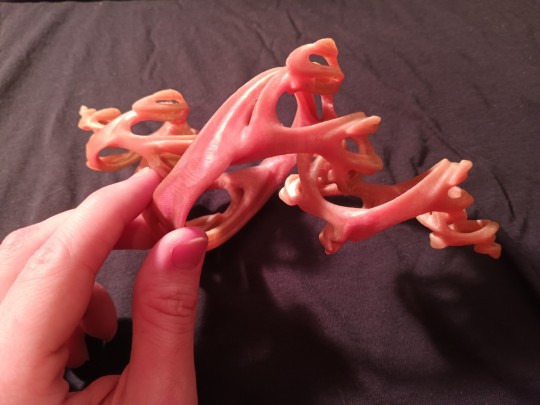


I realized I hadn't shared this here yet! Here's my 3D printed Quaternion Julia Set! See I first learned of these things reading about it from a pretty well known graphics programmer Inigo Quilez. Theirs are a lot prettier! But yeah, if you're familiar with Julia Sets and the Mandelbrot set already, this is basically that but we use 4D complex numbers called quaternions instead of the regular old complex numbers.
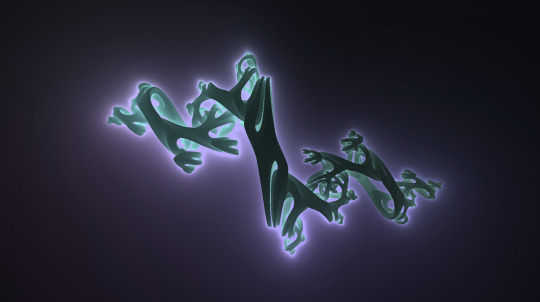
The original shaders I used to render them were unity CG/HLSL implementations, but this particular one is from a GLSL implementation over on my shadertoy you can find here: https://www.shadertoy.com/view/tdt3W8 It isn't exactly the same one that I've printed here (I've long lost the exact seed) but it is reasonably close. The way I printed it was I stole some marching cube code for blender and just plugged in the SDF function derived by Inigo Quilez, tweaked the values and eventually got a mesh I can print!

This uh, isn't the one I used lol. It did take a few tries to get one that was both visually interesting and also printable. In fact i wasn't even using the marching cube algorithm at first. I was using Poisson Surface Reconstruction with a python script that casted points to form a point cloud. Basically I was attempting to create a mesh like you would with photogrammetry, just with an abstract object rather than an actual thing or place.
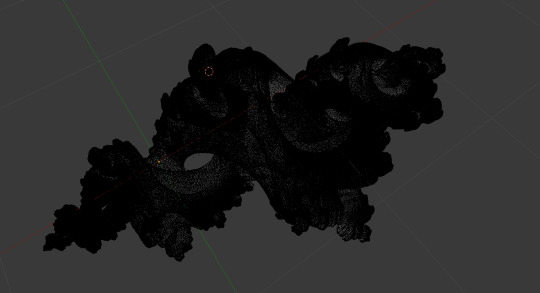
The results were, well not good lol.
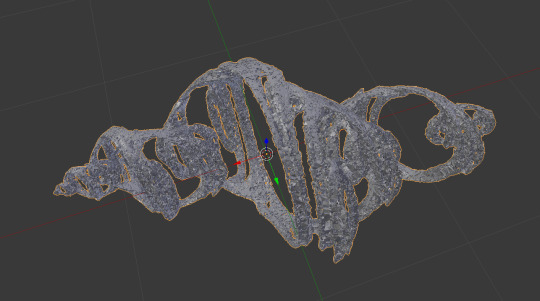
*Continues digging through box* I know its around here some where, I should have the one that works. Okay this still isnt it but this one is using the same method, I just wanted to use this for a vrchat world instead of using it for 3D printing. It gets the point across lol
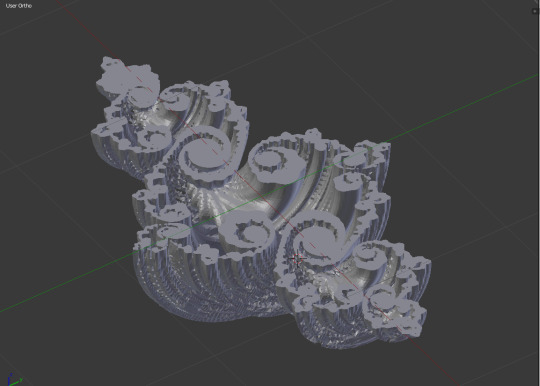
But yeah. 3D printing is really cool if you're into a bit of math
#julia set#fractal#quaternion#quaternions#3d printing#math#mathematics#blender3D#mathblr#progblr#codeblr#mandelbrot#programming#coding
125 notes
·
View notes
Text
The whole question of putting things on t-shirts has got me thinking about it as a design question. Before digital print-on-demand was a thing, t-shirts were usually done with silkscreens, as far as I know. That meant one-color designs were the easiest, with each additional color requiring a separate screen and careful registration.
Silkscreens are good at producing a single isolated element, which is a useful quality in something you want to put on the front of a shirt. In technical art-theory terms, it's a closed composition: the subject(s) do not extend beyond the boundaries of the frame.
Fractals, on the other hand, lend themselves very well to an open composition. They keep going past the edges of whatever arbitrary boundary you've put them in, and extend infinitely.
However. There are a couple of obvious things to start with. If you use a level of magnification that includes the entire fractal set, with space around it, you're back to a closed composition, and you can quite happily stick it on a shirt. Here, for instance, are a Fibonacci Julia with nothing much done to it, and a regular Julia set with orbit traps in the shape of gears.


You can see what they look like on different colors of shirts at polychroma.threadless.com.
7 notes
·
View notes
Text




I aim to explore movement through fractals by looking at their patterns and their relationships.
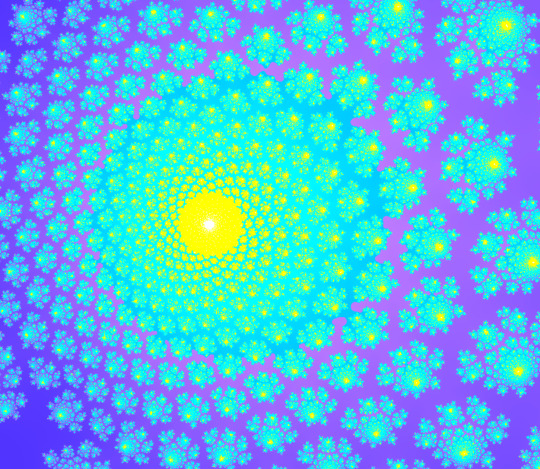
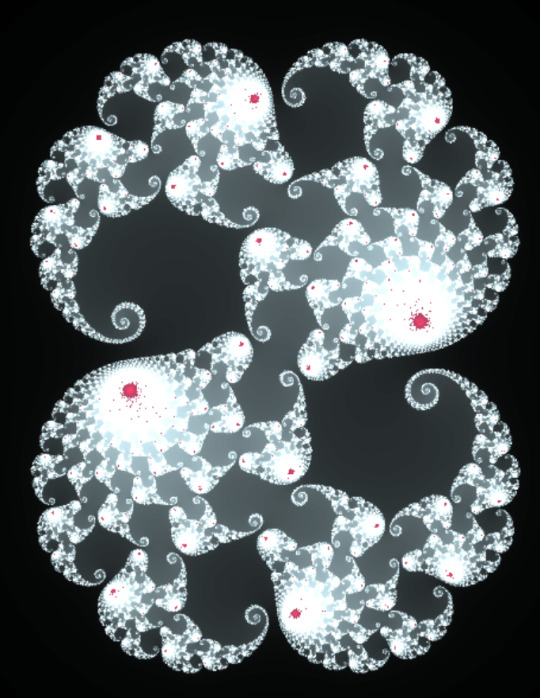

I rely on this site to generate these fractals for primary research, you have the option to look at the Mandelbrot set and The Burning ship, a variation of the Mandelbrot set, where f(z)= |z|^2 + c . It's incredible how the change of taking the absolut value of the result changes the fractal in such a way. Beautiful patterns that look like towers. You can also view both fractal's corresponding Julia sets by selecting a point in the fractal.
These are all similar in being fractals defined by functions. Every point on the Mandelbrot set and the Burning Ship have a related Julia set. I highly recommend playing with this site, or even looking at a video zooming into one of these if you haven't already.
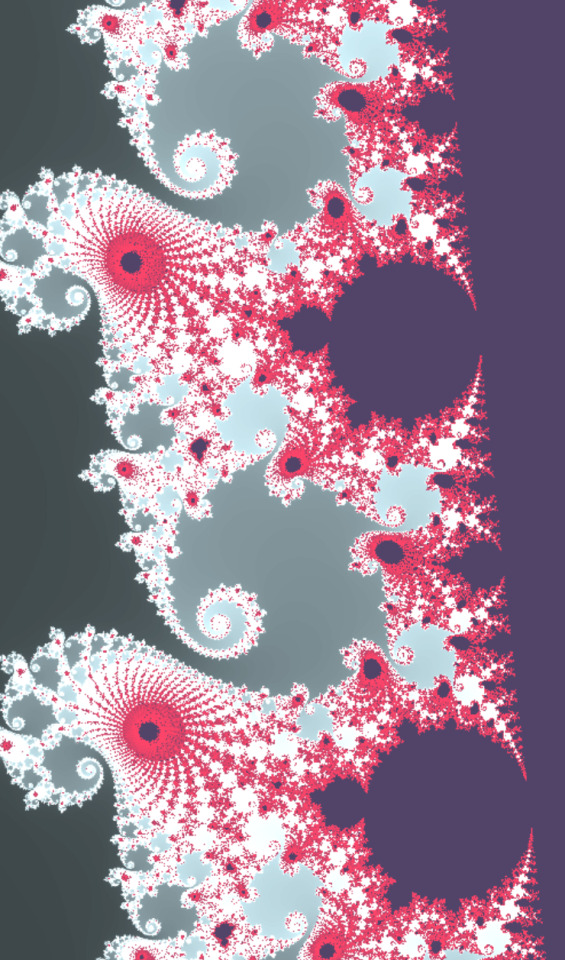
Its complexity is endless. (This image is zoomed in just below the middle, and with different colours.)
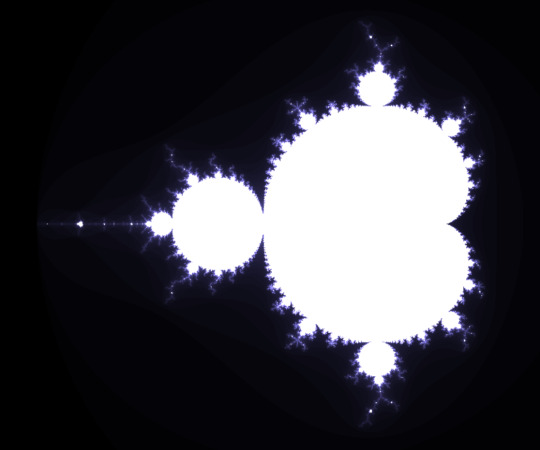
"In mathematics, a fractal is a geometric shape containing detailed structure at arbitrarily small scales, usually having a fractal dimension strictly exceeding the topological dimension."
Instead of assuming that if you look close enough at something its detail would decline and the thing eventually appearing smooth, fractal dimension is a way to measure objects that stay complex, or vary in their complexity as they scale.
The Mandelbrot set is a set in the complex plane where the function f(z) = z^2 + c, c is a complex number and z starts equal to 0, remains bounded and does not spiral off into infinity. When you colour what is inside the set a specific colour, and arbitrarily assign a gradient to those not inside the set based on how fast they diverge to infinity, you get something like the above.
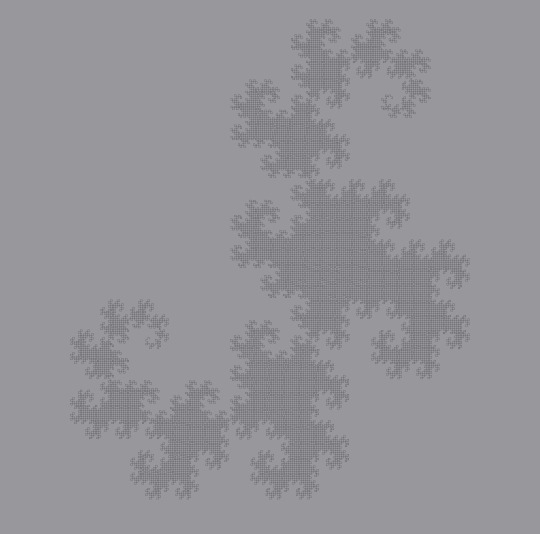
It's difficult to define what a fractal is. There are self similar fractals, where the whole is made up of smaller versions of the whole. It's easiest to see in the Serpiński triangle and Serpiński carpet. (I drew the carpet poorly here, but it gets the point across. I find it easier to draw by hand.)
The Dragon Curve above is another example of a self similar fractal. a curve that never intersects with itself.
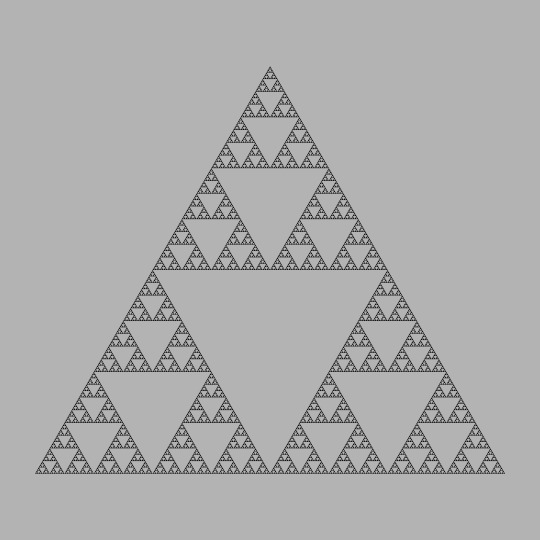
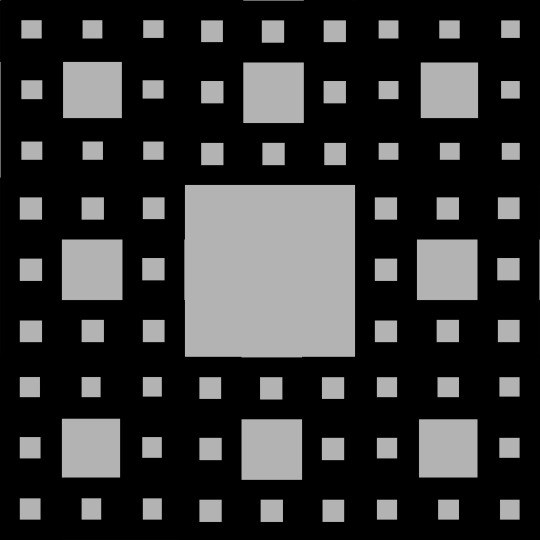
With this week gone to exploration and preparation, I am certain I want to examine fractals through this project.
Movement project: Fractals (week 13/01/25 -> 19/01/25)
6 notes
·
View notes
Text
various fractals/fractal adjacents and what i call them so y 'all don 't have to keep wondering who i mean by stingray and such
mandelbrot set -> the stingray
julia sets -> the julias / my plural wife ( fatou dust included here )
cantor set ( ternary specifically ) -> the thirds / one third left beef
menger sponge -> holey cubie / cubie
sierpiński triangle ( and all sierpiński stuff ) -> train angel(s)
koch snowflake -> the snowflake
burning ship -> boatie
gosper curve -> gossip girl
newton fractal -> holy basin
more to come whenever i feel inspired . suggestions welcome
8 notes
·
View notes
Text

7 notes
·
View notes


